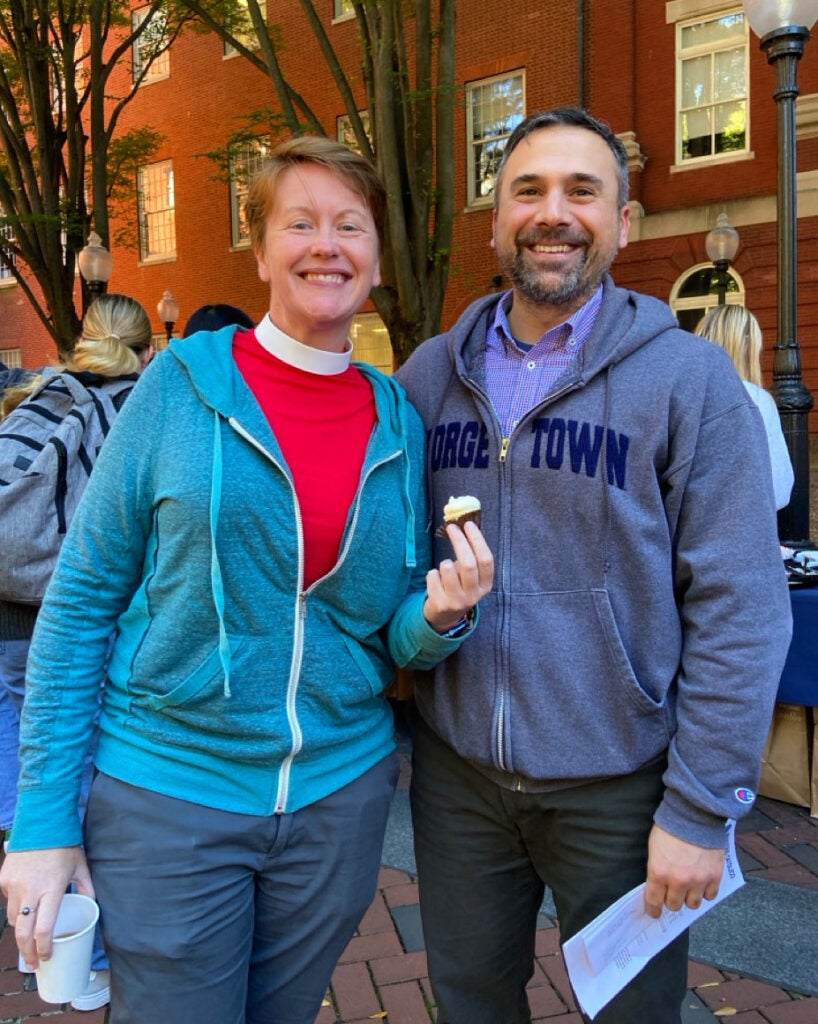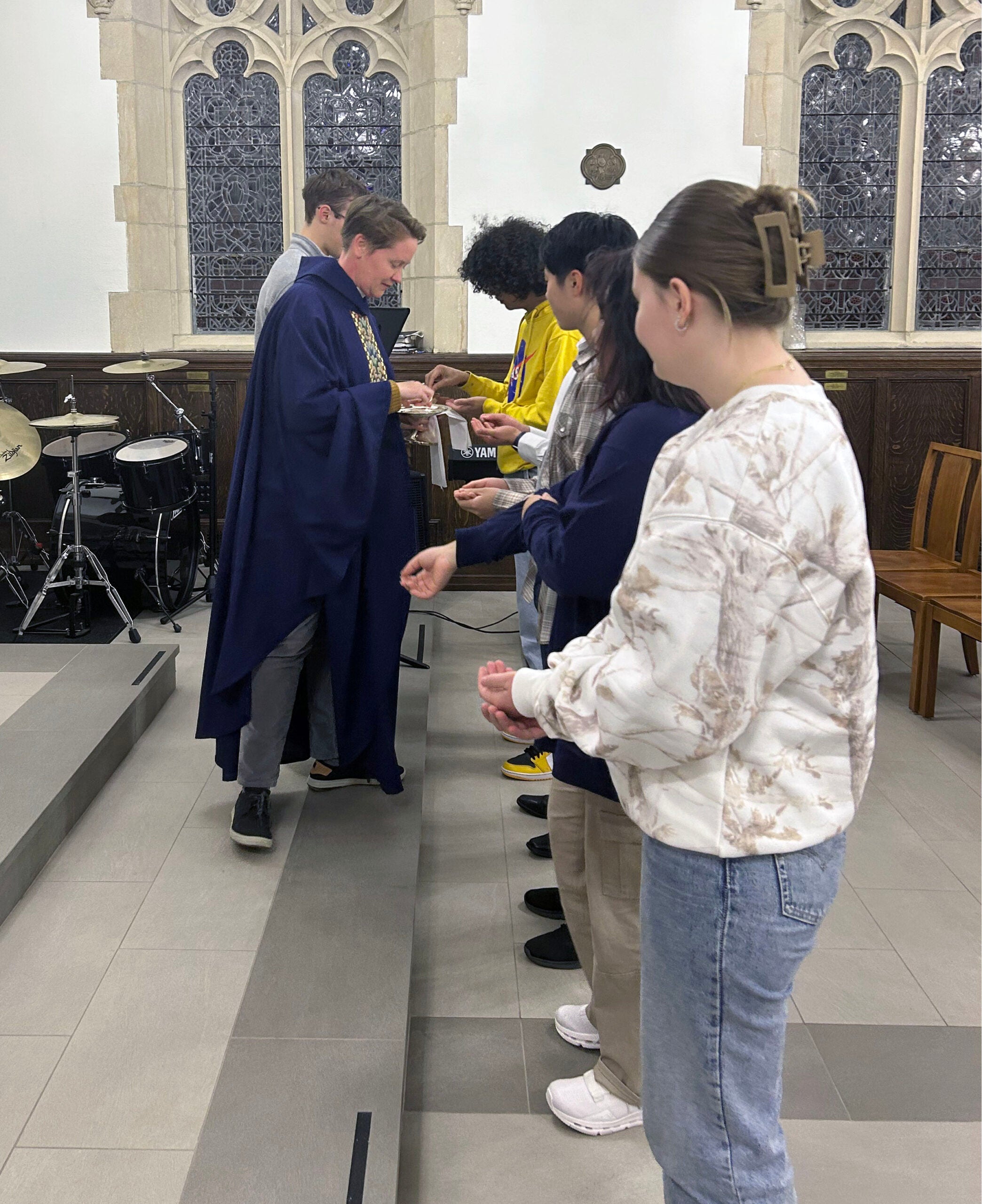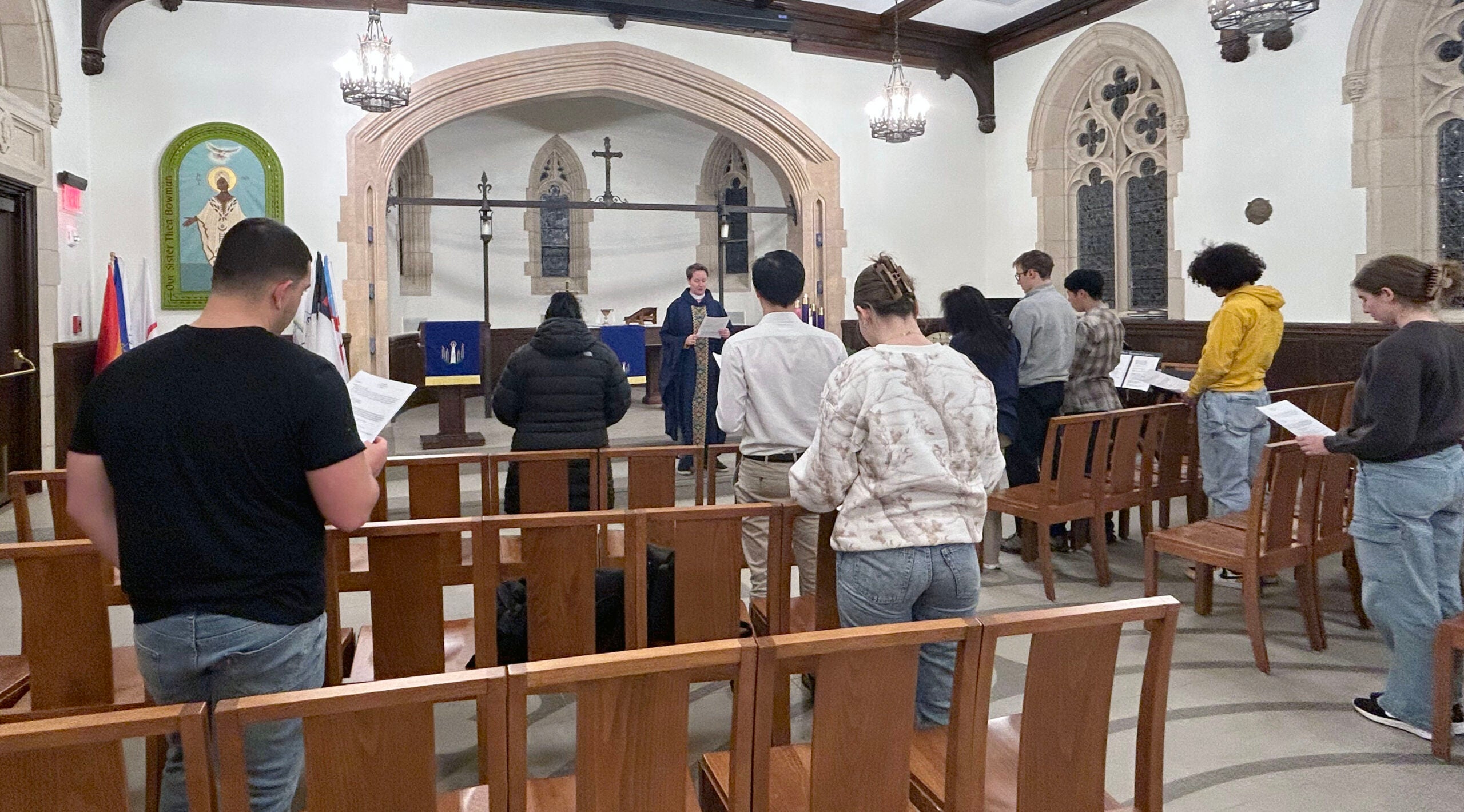Women in Faith: Rev. Cara Rockhill
As the new Episcopal Chaplain, Rev. Cara Rockhill approaches her role with flexibility, one-on-one connection, and her whole self.
By Jennon Bell Hoffman
Reverend Cara Rockhill has been a part of Georgetown University’s Campus Ministry for only a few months but she has already felt the deep introspection and strong community of the Hilltop. As the Episcopal Chaplain and part of the Protestant Ministry team, Rev. Cara tries to help everyone see how God is relevant today through interreligious and ecumenical engagement, finding God in the moments we are in, and by advocating for mental health and neurodiversity. As part of our Women in Faith series, Rev. Cara recently chatted with us about how she’s settling into her role at Georgetown and how she helps students find their place within the community.

Rev. Cara Rockhill, Episcopal Chaplain
Campus Ministry: I know from your bio that you are originally from the DMV area (DC/Maryland/Virginia) area and ordained in the Episcopal Diocese of Washington. What brought you to Georgetown?
Rev. Cara Rockhill: Originally, I’m from Southern Maryland, and the church that sent me forth to seminary, St. John’s Georgetown, is just down O Street. I’m ordained out of DC and worked in New England in a couple of different ministry positions for a number of years. Then, my mom got sick. Quickly and unceremoniously, without telling anybody, we moved back to Southern Maryland at the end of last August. I’m the only child of a single mom, so we’re very close, and a lot fell to me. When my Mom died last fall, I looked at my life, and I thought, “You know what? I could take a sabbatical right now. I could just take a break and I need to. I can’t be anybody’s faith leader right now. I shouldn’t be anybody’s faith leader right now, because I’m not okay.” And so I took the time to be okay again. Right as I was coming out of that, I was at a Washington Spirit game, in a crowd of 15,000 people, and this friend of mine from life—Madeline Vitek Memenza, who is the Director for Mission Engagement—saw me, gave me a big hug, and whispered in my ear, “We still need an Episcopal chaplain.”
CM: How serendipitous. Besides the good timing, what about Georgetown intrigued you?

Rev. Rockhill at Chaplains’ Tea with Dr. Russell Weismann, Liturgical Music Director & Organist
CR: Well, I looked into it and I saw that Georgetown hit all of my big theological points: It’s ecumenical, it’s intentionally diverse, we’re trying to meet the needs of people where they are, instead of expecting them to be something other than who they are.
Also, I’ve really begun to relate to the Ignatian values that exist here, particularly understanding and incorporating all of who you are into your faith and your life. And as I learned more about [the role], I felt, “Oh, well obviously, that’s where I should be.”
CM: When you started this school year, what were you walking into? What excited you about the role as an Episcopalian chaplain?
CR: I liked that I’d be starting something from scratch. There isn’t a mainline Protestant service that’s based in the more formal liturgical style, so I’ve created this based in the Episcopal tradition, rooted in the Book of Common Prayer, a service that really focuses on the essence of the Episcopal-ness of my identity, and try to apply it and create something for Georgetown.
CM: I know it’s been only a few months, but what are your first impressions? How has it been going, starting this new role?
CR: It’s been fun! And not every priest can do a church plant, which is a buzzword for starting something new, in this case, starting something from scratch. We started with two students in the first week, and we just had week seven with 10 students. So we’re growing and engaging and hitting a need that exists here. In the Episcopal Church, our ethos is to be the middle way—via media. That’s our thing. And I took a look at what already exists here—the Catholic services and the Protestant services that exist—and I felt that there’s this little nook of a contemplative, more formal liturgy, which the Episcopal Church has, that includes a more ritually grounded Eucharist, which the Episcopal Church also has. I felt we could do that here, and 一from what I can tell so far一it is actually hitting something that some students were yearning for.

Rev. Cara Rockhill distributing communion
CM: What has stuck out to you about the students you are meeting? What are your early impressions of students’ engagement and the Georgetown community?
CR: A thing that’s important for me about this demographic here is that Georgetown students are really bright, and they’re learning theology as well. For me, it’s important that they have a place to talk about what they’ve learned and what I’ve offered in the homily, [because they’re] coming to find themselves, right? So to have a place where you can say, “Hey, we just talked about this complex thing or idea [in class or service]. Let’s talk about it.” And they do engage in some beautiful and brilliant ways. And that’s what I’m trying to create: a place to help people make good choices as they go forward in life.
CM: What are you using to guide your work as you figure out how to connect with students, to make yourself accessible?
CR: Mostly, it’s just meeting people and being out there. And I’m an openly gay, ordained person on this campus, which may surprise a lot of people. So I have great conversations about faith and sexuality with people, and with those students who have maybe never heard that God loves them, that they are beloved children of God. I’m having conversations with people who are unpacking different religious systems and who are trying to find something that works for them, and where they are in their life right now.
And I think for all of us as chaplains, it’s being present to help people with where they are. What I’m astounded by is that Georgetown students—they find you. They will seek me out for whatever reason and I want to be open to it.
CM: During your own life zigs and zags, who have you looked up to? Who inspired you to find your way?
CR: As I mentioned earlier, I’m the only child of a single mom, and she made sure that there were always strong women around me. My mom is the single biggest influence on my life. Also my grandma, who passed away when I was 16. She was this amazing, fierce, powerful woman. When my grandfather died, she had to step into a different role, and did beautifully to become the matriarch and patriarch of our family. My mom was matriarch and patriarch for me—she was mom and dad, and it was great.
As I grew into faith, I stumbled upon a mentor in the Reverend Virginia Gerbasi, who is the rector at St John’s Georgetown, and I know without her leadership, guidance, and spiritual support, I wouldn’t have made it through the ordination process.
I had a couple of really wonderful professors in seminary, Dr. Denise Dombkowski Hopkins, and Dr. Carla Works, at Wesley Theological Seminary, who helped me really fall in love with the Bible and with theology. They’ve really helped me learn the difference between reading the Bible and studying theology, and that’s been crucial for me as I unpack a lot of the experiences of my own journey.
CM: This series is about how the women of Georgetown embrace, share, and live their faith. How has faith shaped your own path?
CR: I’m still new to Ignatian spirituality, but for me, the crux of it has become understanding yourself and your role in the world, and Campus Ministry really embraces that.
It’s great to be in a place that respects that there’s a role for clergy in the world. In a lot of my different career paths—I sold cars, I was a trial attorney, a criminal defense attorney, and a hospital chaplain, and I’ve been a younger-looking woman—I’ve often had to fight, or explain, or prove why I deserve to be in a room, and I haven’t had to do that here. It’s huge to not have to explain why religion matters. Especially for me, as a queer person, as a woman, as an educated woman, to not have to explain why this thing that I believe in so much—that wasn’t at all accepted 100 years ago, or really, 50 years ago—why this is so important. That is great, and it has allowed me to focus more on the point of it all, the “Well, what are we doing here? How can we do it? How can I help support what’s already here?”
Particularly as a woman in faith, I think finding my unique space in a denomination and career which is traditionally male-dominated and developing my unique relationship with God has been fundamental for developing my role as a faith leader. Because of that, it has made me a very flexible person. It’s what makes me a good chaplain, very flexible, not in my beliefs, but in my approaches. I think this is a hallmark of all of the chaplains here, but what I’ve particularly seen in my female-identifying colleagues is that we don’t feel like we can only do this one way. Instead, it’s more like, “Let’s find out what works for you. How are you best going to relate to God?”
CM: What works for you? How do you connect to your faith?
CR: I tell people very honestly, the best way that I relate to God is through nature. I grew up on the Chesapeake Bay, and I learned to look for shark teeth on the beach before I could walk. It’s still my favorite spiritual practice because it takes all of my attention, all of my focus, to find these tiny triangles on the vast sand. I get a chance to commune with God in nature and offer prayers and hopes for myself and my mom. Over this last year, it’s been a really beautiful experience for me, and I hope that I can help individuals live and breathe and grow as they go forward as adults.
Rev. Cara Rockhill (she/her) is the Episcopal Chaplain and part of the Protestant Ministry team.
Jennon Bell Hoffmann is a freelance writer and editor living in Chicago.
- Tagged
- Episcopal
- Women In Faith
